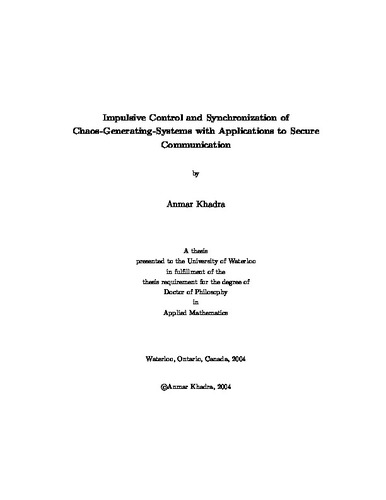| dc.description.abstract | When two or more chaotic systems are coupled, they may exhibit synchronized chaotic oscillations. The synchronization of chaos is usually understood as the regime of chaotic oscillations in which the corresponding variables or coupled systems are equal to each other. This kind of synchronized chaos is most frequently observed in systems specifically designed to be able to produce this behaviour. In this thesis, one particular type of synchronization, called impulsive synchronization, is investigated and applied to low dimensional chaotic, hyperchaotic and spatiotemporal chaotic systems. This synchronization technique requires driving one chaotic system, called response system, by samples of the state variables of the other chaotic system, called drive system, at discrete moments. Equi-Lagrange stability and equi-attractivity in the large property of the synchronization error become our major concerns when discussing the dynamics of synchronization to guarantee the convergence of the error dynamics to zero. Sufficient conditions for equi-Lagrange stability and equi-attractivity in the large are obtained for the different types of chaos-generating systems used. The issue of robustness of synchronized chaotic oscillations with respect to parameter variations and time delay, is also addressed and investigated when dealing with impulsive synchronization of low dimensional chaotic and hyperchaotic systems. Due to the fact that it is impossible to design two identical chaotic systems and that transmission and sampling delays in impulsive synchronization are inevitable, robustness becomes a fundamental issue in the models considered. Therefore it is established, in this thesis, that under relatively large parameter perturbations and bounded delay, impulsive synchronization still shows very desired behaviour. In fact, criteria for robustness of this particular type of synchronization are derived for both cases, especially in the case of time delay, where sufficient conditions for the synchronization error to be equi-attractivity in the large, are derived and an upper bound on the delay terms is also obtained in terms of the other parameters of the systems involved. The theoretical results, described above, regarding impulsive synchronization, are reconfirmed numerically. This is done by analyzing the Lyapunov exponents of the error dynamics and by showing the simulations of the different models discussed in each case. The application of the theory of synchronization, in general, and impulsive synchronization, in particular, to communication security, is also presented in this thesis. A new impulsive cryptosystem, called induced-message cryptosystem, is proposed and its properties are investigated. It was established that this cryptosystem does not require the transmission of the encrypted signal but instead the impulses will carry the information needed for synchronization and for retrieving the message signal. Thus the security of transmission is increased and the time-frame congestion problem, discussed in the literature, is also solved. Several other impulsive cryptosystems are also proposed to accommodate more solutions to several security issues and to illustrate the different properties of impulsive synchronization. Finally, extending the applications of impulsive synchronization to employ spatiotemporal chaotic systems, generated by partial differential equations, is addressed. Several possible models implementing this approach are suggested in this thesis and few questions are raised towards possible future research work in this area. | en |

